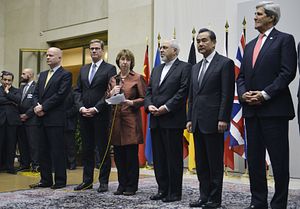The momentum provided by the international nuclear agreement with Iran could reinvigorate the Obama administration’s diplomatic efforts in East Asia, lending the United States the international credibility to press for an overarching nuclear deal in North Korea. Similarly, the pivot to diplomacy could open doors in the South China Sea and East China Sea disputes, displaying to all parties that the United States is an honest broker, interested in the peaceful resolution of the world’s most critical flashpoints. Domestically, Obama may be able to use the political capital won through this agreement to push back against Congressional critics of the Affordable Care Act.
Unfortunately, almost none of the preceding is true. Just as diplomatic defeat rarely results in any kind of meaningful loss of “reputation,” or “credibility,” diplomatic victory often fails to open doors, or to have broader effects around the world. The pursuit of a diplomatic option with Iran probably does not reflect a sudden administration “shift” to diplomacy, at least not in terms that are transferable to other areas. The notion that all commitments are dependent flatters American sensibilities with respect to being an “indispensible” nation; in fact, most diplomatic disputes involve local players concerned about local problems. Already, the dominant issue in East Asia has become the ADIZ, which has swamped the attention given to Iran. And in context of an agreement afflicted with horrifically bad metaphors, it’s worth killing the next generation before it can breed.
So with the lazy punditry pre-emptively disposed of, how does the Iran deal matter for East Asia? The interdependence of commitments matters when a victory or agreement in one area frees up diplomatic, military, or economic resources that can then be deployed to another area. The achievements of diplomacy with Iran are best considered in isolation, and in clear terms of costs and benefits. As Flashpoints authors Zach and Ankit noted earlier this week, the implications of the deal are overwhelmingly positive for energy consumers in East Asia in the medium and long term. For arms suppliers (especially China and Russia), the prospect of taking advantage of the Iranian market will also be a major plus.
Down the road, de-emphasizing conflict with Iran could lead to significant changes in how the U.S. Navy deploys itself. For example, the “small boat” threat that has caused constant concern in naval circles is primarily focused on Iran. The nuclear problem isn’t the only dispute that the United States has with Iran, and we shouldn’t expect that a (temporary) resolution of the nuclear issue will open the door to solving problems such as Iran’s support for terrorism, horrible human rights record, differences over the futures of Iraq and Afghanistan, or the long-term struggle for influence between Iran and Saudi Arabia. However, dialing back the conflict over the nuclear program culls the scenarios for war in the near future, almost all of which focus on a U.S. or Israeli attack on Iran’s enrichment infrastructure.

































